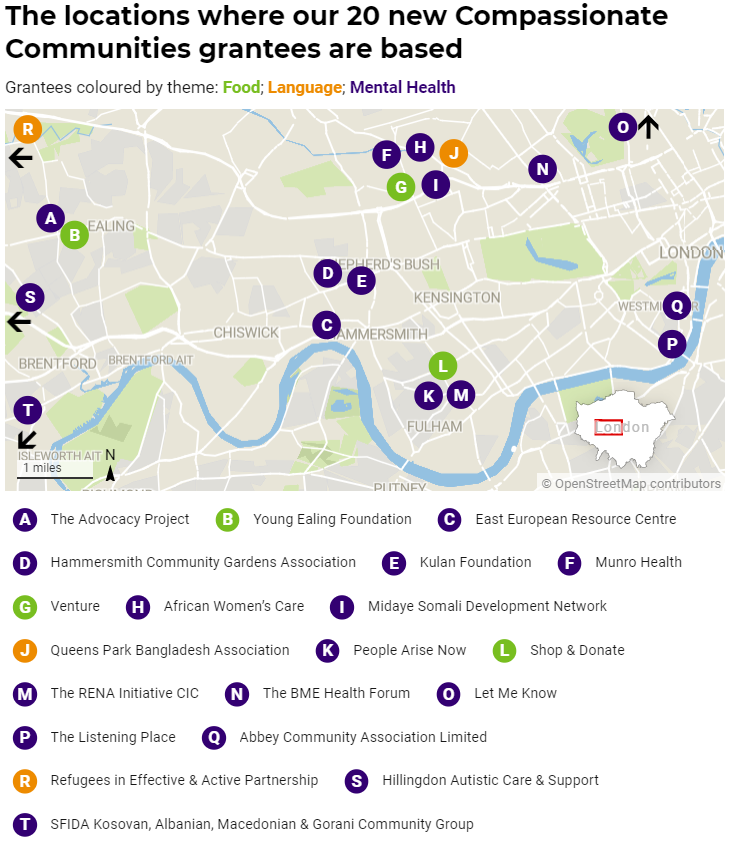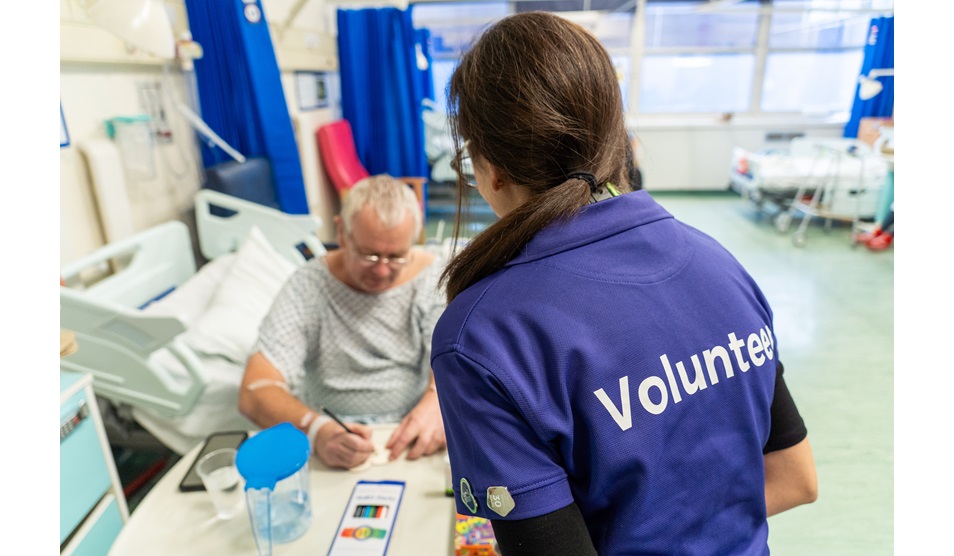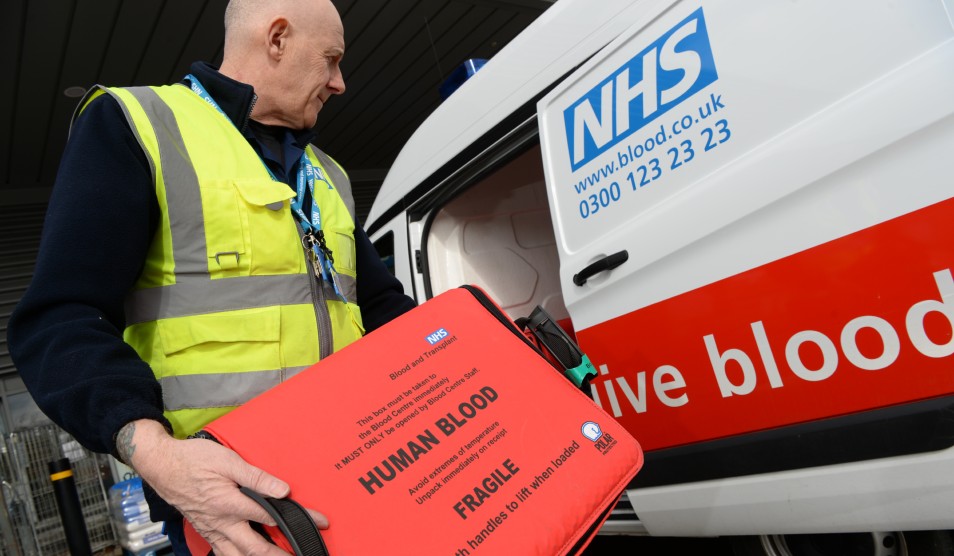'Compassionate communities' supports local health projects to address impacts of Covid-19
Imperial College Healthcare NHS Trust and Imperial Health Charity have today announced 20 community organisations that will receive up to £30,000 in vital funding to improve the health and wellbeing of people most affected by Covid-19 in north west London.
Imperial Health Charity has committed £360,000 for the joint ‘Compassionate communities’ initiative to help local organisations address some of the barriers that prevent the most vulnerable members of the community accessing healthcare and have contributed to them being most significantly affected by the Covid-19 pandemic.
The chosen projects all work with people who experience health inequality and some of the complex, longer-term impacts of Covid-19. The projects will also receive advice and support to help them maximise the impact of their work and make their projects more sustainable.
Dr Bob Klaber, director of strategy, research and innovation at Imperial College Healthcare NHS Trust said:
“The Covid-19 pandemic hasn’t just affected our hospitals, it’s had wide ranging effects on our local communities as well, exacerbating health inequalities. We serve some of the poorest communities in London and, by offering support to groups who have a strong understanding of the needs of their community, we can help to address head-on some of the most pressing issues affecting people’s health in north west London, including food poverty, poor mental health and digital exclusion.”
Ian Lush, chief executive of Imperial Health Charity, said:
“Compassionate communities is a key part of both the Charity’s and the Trust’s strategy to expand our reach and support the health of the local population beyond our hospital walls. Our investment will enable partners in the local community to help those with complex needs whose health and wellbeing has suffered significantly as a result of the pandemic. We hope this initiative is just the beginning as we work to build strong links with our local communities and encourage future collaborations.”
The projects selected include:
Speak Up Radio – a new online radio station created by The Advocacy Project, providing accessible advice and information for people with learning disabilities and mental health concerns in Westminster and Kensington & Chelsea helping to tackle loneliness and isolation, and lessening digital exclusion for some of the boroughs’ most marginalised people. The station will begin broadcasting for three hours a week in June, growing to six hours from September.
The social supermarket – will be opened by Shop & Donate to provide good quality food at significantly reduced prices for local people living in poverty in the boroughs of Hammersmith & Fulham and Kensington & Chelsea. Shop & Donate will also operate a food delivery service for elderly and vulnerable residents.
Covid communication for Bangladeshi community – North west London is home to large pockets of marginalised people of Bangladeshi origin who are experiencing cultural, religious and communication barriers on top of poverty and other social and health problems. The Queen’s Park Bangladesh Association will support around 120 local people, primarily from the Bangladeshi community, to improve access to credible and reliable information about Covid-19 and related support services. They will also provide emergency food parcels for vulnerable individuals and families that are homebound or unable to use local food banks due to cultural unsuitability.
Grow Well in 2021 – aims to support local people who have struggled with mental health and wellbeing during the pandemic. Hammersmith Community Gardens Association will give adults the chance to take part in therapeutic gardening sessions and short courses. The project will provide a range of gardening and cooking activities giving participants the opportunity to engage with the community and spend time closer to nature. The project also aims to inform participants about the mental and physical benefits of nature, enabling them to try new food, and take produce and plants home with them.
Compassionate communities is a pilot programme for 12 months from May 2021. The programme has been designed with the help of more than 80 local groups to ensure the funding reaches those who need it the most. The funding is focused on Covid-19 recovery and is being awarded to local organisations to tackle health inequalities within the community, ranging from mental health and wellbeing, to food poverty, or addressing the language barriers faced in access to healthcare.
The full list of organisations who will receive funding is:
- Abbey Community Association - £29,371
- African Women’s Care - £25,500
- BME Health Forum - £29,976
- East European Resource Centre (EERC) - £28,380
- Hammersmith Community Gardens - £9,930
- Hillingdon Autistic Care and Support - £9,550
- Kulan Foundation - £10,000
- Let Me Know (LMK) - £6,760
- Midaye Somali Development Network - £25,755
- Munroe Health - £20,000
- People Arise Now - £8,017
- Queen’s Park Bangladesh Association - £10,000
- Refugees in Effective and Active Partnership (REAP) - £10,000
- SFIDA - £9,590
- Shop and Donate - £4,559
- The Advocacy Project - £29,954
- The Listening Place - £25,625
- The RENA Initiative - £9,994
- Venture Community Association - £29,075
- Young Ealing Foundation - £28,760

ENDS
NOTES TO EDITORS
For further information, please contact the press office on 020 3313 3005.
About Imperial College Healthcare NHS Trust
Imperial College Healthcare NHS Trust is one of the largest NHS Trusts in England, with over 14,000 staff providing acute and specialist healthcare for a local population of nearly two million as well as patients from across the UK and overseas. The Trust has five hospitals - Charing Cross, Hammersmith, Queen Charlotte's & Chelsea, St Mary's and The Western Eye.
About Imperial Health Charity
Imperial Health Charity helps the five hospitals of the Imperial College Healthcare NHS Trust do more through grants, arts, volunteering and fundraising. It funds major redevelopments, research and medical equipment, as well as helping patients and their families at times of extreme financial difficulty. Supporting the arts in healthcare, the charity also manages an Arts Council accredited hospital art collection and runs an arts engagement programme for patients and NHS staff. It manages volunteering across all five hospitals, adding value to the work of staff and helping to improve the hospital experience for patients and visitors. www.imperialcharity.org.uk.





